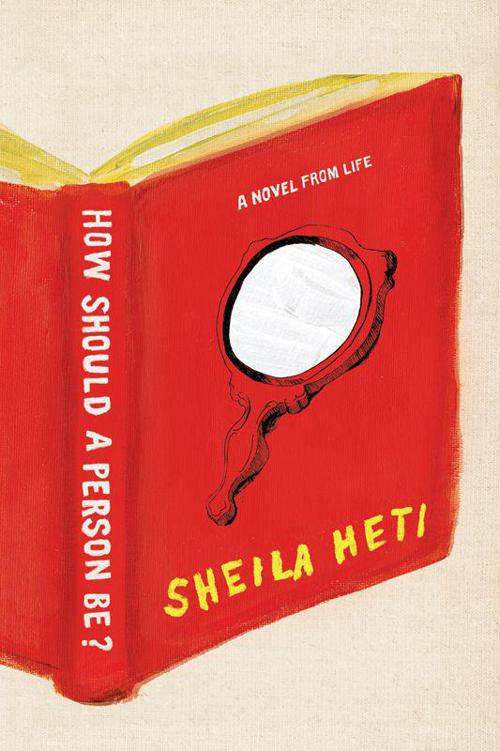
How Should a Person Be?
A Novel from Life
کتاب های مرتبط
- اطلاعات
- نقد و بررسی
- دیدگاه کاربران
نقد و بررسی

April 30, 2012
With a quirky mixture of e-mails, transcribed conversations, and prose, frequent Believer contributor Heti (2004’s The Middle Stories) examines her titular question by emphasizing that, like life itself, the story of protagonist Sheila; her degenerate artist boyfriend, Israel; and her best friend, Margaux, doesn’t always make perfect sense. After she leaves her husband, Sheila—an aspiring Toronto playwright by night and hair salon employee by day—looks to her friends and the world at large to determine how to be. Acts divided into chapters interspersed with conversations transcribed to read like plays follow Sheila from home to New York to Atlantic City in her search for clarity. Autobiographical elements abound: like Heti’s metafictional protagonist, the author studied playwriting and lives in Toronto. Heti has an artist friend named Margaux with whom she has collaborated and to whom she dedicates this novel. Original, contemplative, and often tangential, this is an unorthodox compilation of colorful characters, friendship, and sex that provides an unusual answer to Heti’s question. Agent: Jim Rutman, Sterling Lord Literistic.

July 1, 2012
Toronto-based Heti (Ticknor, 2006, etc.) and her real-life friends, including Misha Glouberman with whom she wrote a previous book (Where the Chairs Are Where the People Go, 2011), are central characters in this meandering novel that attempts to erase the line between fact and fiction. Sheila is a recently divorced playwright--the marriage ended at her request for no clearly spelled out reason--attempting to finish a commissioned play while working part time in a beauty salon where her boss Uri is a kind of guru preaching beauty in balance. She claims what she desires is a simple life of fame without having to change her life. She also talks quite a bit about her search for a sense of self. She spends time with her friend Margaux, an artist who lives with Misha and has entered an ugly painting contest with another painter friend of Heti's named Sholem. Heti buys a digital tape recorder and the novel includes actual taped conversations with Margaux, to whom the novel is dedicated, as well as emails between the two. Margaux and Heti have a falling-out because Margaux feels Heti has invaded her private boundaries, both by taping her and, more egregiously, by buying the same yellow dress while they are at an art festival in Miami. Meanwhile, Sheila has met Israel, who works in a bakery. He considers himself a painter, but Sheila recognizes his real art lies in the sex department. She describes their sadomasochistic antics in explicit, though untitillating detail. For a while, Sheila and Margaux fall into a pattern of heavy partying and druggy debauchery until Margaux pulls away. Sheila worries she's a narcissist, not without good reason perhaps. Claiming imperfect wanderer Moses rather than sinless Jesus as spiritual guide, she leaves Toronto for New York, but she's no happier there. After a gambling jaunt to Atlantic City, she returns to Toronto in time for the conclusion of the ugly painting contest. Pretentious navel-gazing without the humor of HBO's Girls, which covers similar terrain.
COPYRIGHT(2012) Kirkus Reviews, ALL RIGHTS RESERVED.

April 1, 2012
In this innovative novel, Canadian author Heti (Ticknor) invites her readers to share one woman's intensive pursuit of meaning and purpose in life. Through Sheila, who's obsessed with self-reflection, we witness the raw and sometimes painful experience of searching for the truth of one's soul. Sheila is recently divorced, and her friendships, particularly that with painter Margaux, are central to this quest for self-realization; she relies on the desires and expectations of others to determine her own worth. Interestingly, for a somewhat confused character working through the process of self-discovery, Sheila is capable of relaying sharp insights into human nature and complex emotion. The quick dialog and narrative flow make for a deceptively easy read, but to appreciate Heti's intent, readers must be willing to take their time and consider the weight of the questions at the heart of this nonconventional narrative. VERDICT Heti's book will appeal to readers who appreciate an alternative to traditional narrative style and a searing yet playful examination of self.--Catherine Tingelstad, Pitt Community Coll., Greenville, NC
Copyright 2012 Library Journal, LLC Used with permission.

May 15, 2012
With an ambitious and quirky style, Heti ponders one question in her fourth book of fictionHow should a person be?which, of course, results in a mess of doubt, consternation, and confusion. As Heti, the book's author and narrator, labors doggedly to finish her commissioned play, she struggles with how to live as a free woman, lover, friend, and genius. Surrounded by other twentysomething artists, Heti's paint-drenched environment in part encourages a meaningful self-examination, thanks to best friend Margaux's inspiring brush strokes, while simultaneously her courage is inhibited by her lover Israel's prurient demands. Like the Jews, the Chosen People referenced throughout the book, Heti embarks on her own wanderings after forsaking her best friend but eventually discovers that her own promised land is close at hand and accessible. Like Kevin Wilson's The Family Fang (2011) in its inventive and comedic questioning of where life and art intersect, Heti's unrestrained novel will resonate with receptive readers confronting their own authenticity, wrestling with a life crisis, or merely curious about how others cope.(Reprinted with permission of Booklist, copyright 2012, American Library Association.)

























دیدگاه کاربران